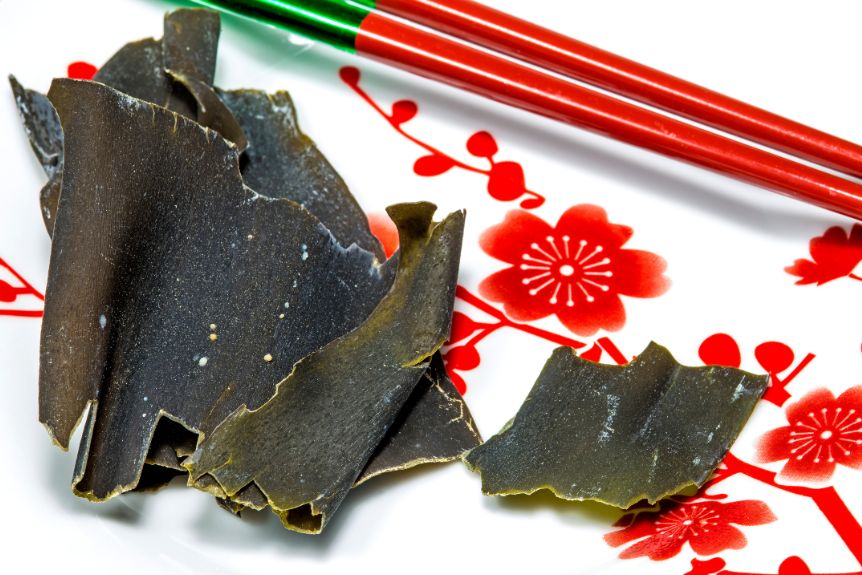Kombu: The Hidden Gem of Japanese Cuisine That Holds the Key to Rich and Nutritious Flavors
Japanese food has a special touch that makes everything taste amazing. Ever wondered why miso soup feels so comforting, or why the vegetables in Japanese dishes are so flavorful? The secret is kombu. It’s like a hidden star in Japanese cooking, quietly making everything delicious.
While its name might be unfamiliar, kombu’s impact on Japanese cuisine is a big deal. It forms the backbone of dashi, a fundamental broth that infuses umami into countless dishes, from soups and stews to sauces and dressings.
But kombu is more than just a flavor enhancer; it also boasts an array of nutritional benefits that can elevate your well-being.
Beyond its culinary uses, kombu holds a place of cultural significance in Japan. Its history and traditions are intertwined with the country’s heritage, leaving a lasting imprint on its cuisine. As we explore the many roles of kombu, from its origins to its revered place at the Japanese table today, you’ll discover why this humble seaweed is an indispensable ingredient in Japanese cooking.
Prepare to be captivated by the depth and complexity of kombu’s flavors, as we uncover its secrets and explore how you can integrate this hidden gem into your own culinary adventures. Get ready for a tasty adventure into the world of kombu. It’s a journey full of rich flavors and nutrition, all ready to be discovered and enjoyed!
The History of Kombu
Kombu, a key ingredient in Japanese cooking, has been gathered from the sea for hundreds of years. It’s woven into the very history of cooking, leaving its mark through time. You’ve likely encountered its subtle umami flavor in broths and soups, not realizing the depth of its story.
This seaweed isn’t just a food item; it’s a cultural artifact, meticulously gathered and prepared with techniques perfected over generations. Its cultivation and usage reflect a harmony between nature and culinary tradition, showcasing a respect for the ocean’s bounty that’s been ingrained in Japanese culture.
You hold the power to explore and influence this tradition. By choosing kombu, you’re not just selecting an ingredient; you’re participating in a centuries-old culinary practice.
Your cooking becomes a link in the chain of history, and you have the control to shape its future. Whether you’re simmering a dashi broth or experimenting with new recipes, you’re contributing to the evolution of this historic food.
Kombu’s journey from the sea to your kitchen is a testament to culinary innovation and cultural preservation, and now, you’re a part of its story.


Culinary Uses of Kombu
Diving into the kitchen, you’ll discover that this versatile seaweed plays a crucial role in a wide array of Japanese dishes, from enriching broths to enhancing the flavors of simmered foods. Kombu isn’t just a seaweed; it’s your secret weapon for umami, the savory taste that’s key to many mouth-watering dishes.
You’ll find it at the heart of dashi, the foundational broth that injects depth into soups, stews, and sauces. But don’t stop there. You can wield kombu to elevate your cooking to new heights, adding layers of flavor that bottled seasonings can’t match.
Take control of your culinary creations by introducing kombu into your rice. A small piece added while cooking infuses each grain with a subtle, savory complexity. And when you’re aiming for a standout side, simmer vegetables with a strip of kombu. It not only seasons them but also softens their fibers, making them more palatable and digestible.
Kombu in Dashi Preparation
In the center of Japanese cooking is dashi, a broth that gets a big flavor boost from kombu. It’s the kombu that adds that deep, savory umami taste everyone loves. Making your dashi from scratch lets you control the depth and intensity of flavors, ensuring your dishes have that authentic taste profile you’re aiming for.
To start, you’ll need to select a piece of high-quality kombu. Look for thick, clean strips with a white powdery substance on the surface—this is where much of the umami comes from. Gently clean the kombu with a damp cloth, but don’t wash it, as you’ll remove the umami-rich powder.
Next, soak the kombu in cold water for about an hour. This slow extraction process is critical for achieving the desired flavor complexity without bitterness. If you’re short on time, a quick soak in lukewarm water for 10-15 minutes can work, but the flavor won’t be as developed.
After soaking, slowly heat the water to just before boiling, then remove the kombu. Boiling it can release bitter flavors, so keep an eye on the temperature. You now have a kombu dashi foundation ready to elevate your soups, stews, and sauces with unparalleled depth and authenticity.
Nutritional Benefits of Kombu
While mastering the art of preparing dashi with kombu enhances your dishes’ flavor, it’s also worth noting the significant nutritional benefits this seaweed offers.
Kombu is more than just a key ingredient in cooking; it’s packed with nutrients that are great for your health. When you add it to your soups and broths, you’re not just making them tastier; you’re also filling them with lots of vitamins and minerals.
Kombu is rich in iodine, essential for thyroid function, helping you maintain a balanced metabolism. It’s also packed with dietary fiber, aiding your digestive system and promoting a feeling of fullness, which can help in weight management.
The presence of iron, calcium, and Vitamin K in kombu supports bone health and blood circulation, empowering you to take control of your physical well-being.
Incorporating kombu into your diet means you’re also getting a dose of powerful antioxidants like fucoidan, which has been linked to anti-inflammatory and anti-cancer properties. This isn’t just about making your food taste better; it’s about making choices that fortify your body against diseases.
Embrace kombu in your kitchen, and you’re not just enhancing flavors—you’re consciously deciding to nourish your body with every meal.


Cultural Significance of Kombu
Kombu holds a revered place in various cultures, particularly in East Asia, where it’s been an integral part of culinary traditions for centuries. You’ll find that its significance goes beyond mere nutrition; it’s a symbol of health, prosperity, and a deep connection to the sea.
In Japan, for instance, kombu plays a pivotal role in the preparation of dashi, the foundational broth that underpins much of Japanese cuisine. This isn’t just about flavor; it’s about honoring a tradition that dates back generations.
Moreover, kombu finds its way into festive dishes and is often exchanged as a gift, symbolizing good wishes and a long life. You’re not merely consuming a seaweed; you’re partaking in a ritual, embracing a piece of cultural heritage that’s been passed down through the ages.
Understanding kombu’s cultural significance empowers you to approach it with the reverence it deserves. You’re not just adding a dash of umami to your dishes; you’re weaving a rich tapestry of history and tradition into your culinary creations.
Embrace this knowledge, and let it guide you as you explore the depths of East Asian cuisine, ensuring that every dish you craft isn’t only delicious but meaningful.
Conclusion
So, you’ve journeyed through the world of kombu, discovering its roots, culinary roles, and nutritional advantages. You’ve seen how it’s the soul of dashi and a cornerstone of Japanese cuisine.
But hey, maybe you’re not convinced. Maybe you think kombu is just another trendy ingredient that doesn’t live up to the hype. Well, we want to hear from you! Leave a comment below and let’s know your thoughts on kombu.
Have you tried it? Did it live up to your expectations? We’re eager to hear both the positive and negative opinions, so don’t be shy!
Jump into the world of traditional cooking and try using kombu in your dishes. Then, let us know how it goes! Did this ancient wonder change the game for your meals, or was it not quite what you expected? Let’s hear about your experience! Your feedback is valuable, so join the conversation and share your thoughts on kombu!




Konnichiwa! (Hello!) I'm Pat Tokuyama, a Japanese tofu cookbook author, who travels for music, food, and adventure. If you like Japanese tea, checkout some of the newestorganic japanese tea, matcha bowls and noren and more!
** Curious about the Plant Based Japanese Cooking Club? ** Learn more here!